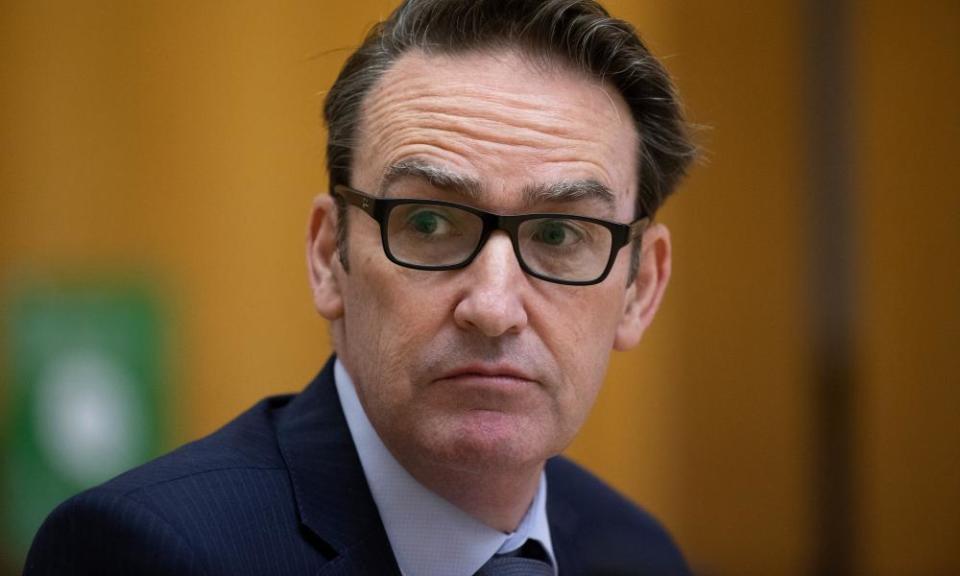Treasury boss 'surprised and concerned' by $30m Western Sydney airport land sale

Steven Kennedy, the former secretary of the infrastructure department, has conceded the controversial land sale at Leppington Triangle related to the second Sydney airport is “now reflecting poorly on all of us, and we need to get to the bottom of it”.
Kennedy, now the head of the Treasury department, faced questions at a Senate estimates hearing on Monday about his knowledge of the land purchase after the Australian National Audit Office excoriated commonwealth officials for paying $30m for land later valued at $3m.
Kennedy said on Monday he was “surprised and concerned” by the findings in the ANAO report, including the criticisms of the department’s processes during his tenure as departmental head. “Frankly, no one would be pleased as a public servant and I’m very disappointed.”
Related: Former state Liberal MP lobbied for landholders linked to Western Sydney airport
The ANAO found departmental officials acted unethically by failing to advise ministers and senior departmental decision makers how much they proposed to pay the landowner, and for not providing accurate answers when it investigated the sale. The Australian federal police is now investigating the transaction.
Kennedy said on Monday: “The fact that information was withheld from key decisions makers means that, in that circumstance, even when your systems are doing a good job, it is hard to be able to provide that information when it hasn’t been provided to you.”
While expressing regret about the events, Kennedy said he was waiting for the outcome of various investigations into the land purchase before forming a view about what he should have done differently. Kennedy said the strong criticism from the ANAO troubled him. “I was the secretary.”
Kennedy was asked whether or not he was aware officials in his department were pursuing the Sydney land deal. “I was aware in broad terms,” he said. “I wasn’t across it in detail.”
The secretary at one point prompted Labor’s line of inquiry by asking himself a question in the hearing – why had he signed off on departmental financial statements that were later demonstrated to be inaccurate?
Kennedy said he signed the statements because he was at that point heading to Treasury for his new appointment and didn’t want to leave his successor with unsigned financial statements. “I didn’t appreciate the significance of this matter,” Kennedy said.
“I did sign off but that will be one of my other reflections – whether I should have chosen to wait until that exercise had been complete, but I felt I was starting a new job in Treasury and I had to be responsible for the year that I had just seen, and a huge amount of activity goes on in that department, and it was my responsibility to sign it off – so I chose to sign it off.”
The current head of Australia’s infrastructure department, Simon Atkinson, agreed last week that it looks as though officials attempted to cover up an inflated valuation for the land sale – and insists that he’s embarked on a clean-up exercise.
Labor has used the imbroglio to step up pressure on the government for failing to follow through with a planned national integrity commission. The independent MP Helen Haines, the member for the Victorian seat of Indi, also on Monday introduced a bill giving effect to her proposal for a federal anti-corruption body.
Related: Western Sydney airport: families left in 'indefinite limbo' call for end to backroom deals
In question time, the Labor leader, Anthony Albanese, asked the prime minister whether the reason the Morrison government had thus far failed to establish the body was because of “the corrupt sports rorts scheme, the Leppington Triangle land scandal, stacking the AAT with Liberal mates, the Liberal mate paid more than $1m for market research, wasting $20,000 on Cartier watches, and the minister for energy’s involvement in countless scandals?”
Morrison declared the presumption of the question was “false”. The prime minister said Labor’s pursuit of integrity issues was a partisan foray.
“What we’ve seen today, I think, is a very good commentary on what’s happening in this chamber,” Morrison said. “The government is focused on the Covid-19 pandemic … protecting Australians at a time of their greatest crisis, and the Labor party comes in here to throw mud around.”
The government has been working on an anti-corruption proposal since 2018. A cabinet submission outlining a proposal recommending that the Australian Commission for Law Enforcement Integrity be converted into a federal integrity commission with two wings – one for law enforcement agencies and the other for public servants and politicians – was being worked up in the weeks before Malcolm Turnbull was removed as prime minister.
The government had an exposure draft of its preferred legislation ready in January this year. Last week, Morrison said the government’s anti-corruption watchdog proposal required complex consultation, and he did not want “one public servant diverted” from managing the public health crisis.
Back in 2018, the attorney general, Christian Porter, said reforming the current anti-corruption functions was not the “first and foremost priority” of the government. Morrison once dismissed a federal integrity commission as a “fringe issue”.

 Yahoo Finance
Yahoo Finance 